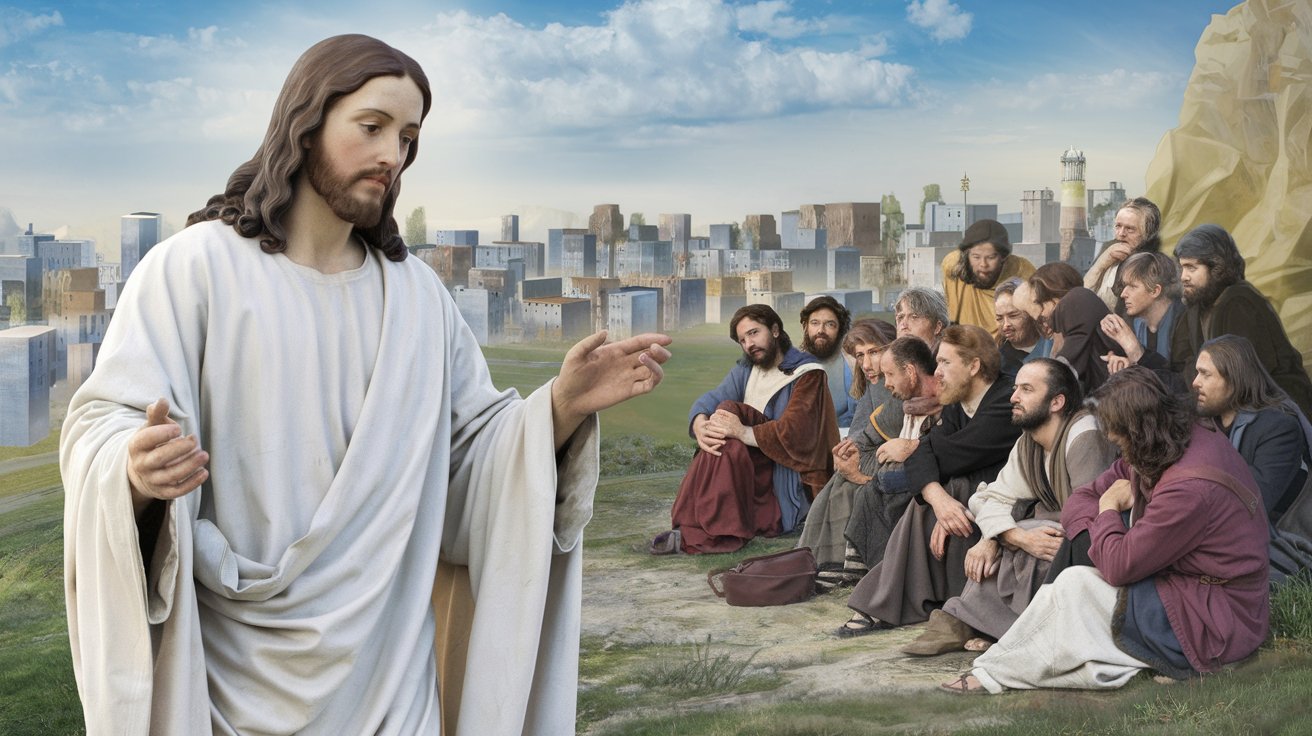
What does "Maranatha" mean? The term "Maranatha" is an Aramaic expression that translates to "Come, O Lord!" or "Our Lord is coming." This powerful phrase, found in 1 Corinthians 16:22, has been a cornerstone of Christian hope and anticipation for centuries. Early Christians used it as a watchword, whispering it to identify fellow believers and express their shared longing for Christ's return. Today, Maranatha continues to inspire devotion and spiritual readiness, reminding believers of the imminent Second Coming. From liturgical prayers to personal devotions, this term encapsulates the essence of Christian eschatological hope and the call to live a life pleasing to God.
Key Takeaways:
- Maranatha, meaning "Come, O Lord!" in Aramaic, symbolizes the hope of Christ's return. It has been a rallying cry for believers throughout history, inspiring devotion and anticipation.
- Maranatha is deeply connected to biblical prophecy and emphasizes the need for spiritual preparation. It represents eschatological hope and continues to inspire believers today.
What is Maranatha?
Maranatha is a term deeply rooted in Christian theology, symbolizing the hope and anticipation of Christ's return. This Aramaic expression translates to "Come, O Lord!" or "Our Lord is coming." Let's dive into some fascinating facts about Maranatha.
-
Biblical Context
Maranatha appears only once in the Bible, in 1 Corinthians 16:22. Paul writes, "If anyone does not love the Lord, let him be accursed. Maranatha." This underscores the urgency and imminence of Christ's return. -
Aramaic Origin
The term "Maranatha" comes from Aramaic, a language spoken in the ancient Near East. It means "Our Lord is coming" or "Come, O Lord!" -
Pauline Usage
Paul's use of Maranatha in 1 Corinthians 16:22 highlights the importance of loving Christ. Those who do not love the Lord are cursed, emphasizing the hope of Christ's return.
Historical Significance of Maranatha
Maranatha has served as a rallying cry for believers throughout history, symbolizing their faith and hope in the Second Coming.
-
Watchword of Early Christianity
Early Christians used Maranatha as a watchword, a password to identify themselves and express their anticipation of Christ's return. -
Historical Significance
Maranatha has been a symbol of faith and hope in various contexts, from liturgical prayers to personal devotions, throughout history. -
Liturgical Use
Maranatha is often incorporated into liturgical prayers and hymns, reflecting the belief in Christ's imminent return. For example, John's prayer "Amen. Come, Lord Jesus" (Revelation 22:20) echoes Maranatha.
Illustrations and Interpretations
The concept of Maranatha has been illustrated and interpreted in various ways, adding depth to its significance.
-
Illustrations and Metaphors
Maranatha has been illustrated through metaphors like Florence Chadwick's swims across the English Channel, symbolizing the swift and unexpected return of Christ. -
Ellen G. White's Interpretation
Ellen G. White, a key figure in the Seventh-day Adventist Church, emphasized living a life ready for Christ's return in her book "Maranatha." -
Prophetic Interpretation
The prophetic interpretation of Maranatha involves understanding it within the broader context of biblical prophecy, guided by the Spirit of God.
Scriptural and Apostolic References
Maranatha is closely tied to several scriptural references and the teachings of the apostles.
-
Scriptural References
Maranatha is linked to passages like 1 Corinthians 16:22, Revelation 22:20, and Matthew 6:10, emphasizing the urgency and hope of Christ's return. -
Apostolic Witness
Apostles like Paul and John were witnesses to the significance of Maranatha, reflecting a deep belief in Christ's imminent return in their writings. -
Early Church Practices
Early Christians used Maranatha as a password and watchword, highlighting the importance of community and shared faith.
Cultural and Theological Impact
Maranatha has influenced art, literature, music, and theological discussions, making it a culturally significant term.
-
Cultural Impact
Maranatha has influenced various cultural works, from hymns to novels, symbolizing the longing for Christ's return. -
Theological Significance
Theological discussions around Maranatha focus on its role in Christian eschatology, reminding believers of the Second Coming and the judgment that follows. -
Historical Debates
Scholars debate the original meaning and usage of Maranatha, with some seeing it as a watchword and others as a personal prayer for Christ's return.
Contemporary Relevance
Despite the passage of time, Maranatha remains relevant today, inspiring devotion and hope among Christians.
-
Contemporary Relevance
Maranatha continues to inspire believers, reminding them of Christ's imminent return and the need for spiritual preparedness. -
Maranatha Mindset
A "Maranatha mindset" involves living with the expectation of Christ's return, being vigilant, righteous, and ready for the Lord's coming. -
Biblical Prophecy
Maranatha is connected to biblical prophecy, particularly in Revelation, reminding believers of the fulfillment of God's plan.
Spiritual Preparation and Eschatological Themes
Maranatha emphasizes the need for spiritual preparation and is closely tied to eschatological themes.
-
Spiritual Preparation
Believers are encouraged to live lives pleasing to God, avoiding sin and cultivating love for Christ in anticipation of His return. -
Judgment and Redemption
Maranatha is associated with judgment and redemption, highlighting the importance of loving Christ and being spiritually prepared. -
Apostolic Warnings
Apostolic warnings about the Second Coming are echoed in Maranatha, emphasizing the urgency of Christ's return. -
Eschatological Hope
Maranatha represents eschatological hope, inspiring believers to live with anticipation of Christ's return and the ultimate victory of good over evil.
Liturgical and Church Practices
Maranatha is incorporated into various liturgical and church practices, reflecting its deep-seated belief in Christ's imminent return.
-
Liturgical Practices
Prayers, hymns, and sermons often include Maranatha, emphasizing the need for spiritual preparedness. -
Historical Figures
Figures like Ellen G. White have written extensively on Maranatha, inspiring devotion and hope among believers. -
Theological Discussions
Theological discussions around Maranatha often involve its significance in Christian eschatology and other related themes.
Cultural References and Personal Devotions
Maranatha has been referenced in various cultural works and is a part of personal devotions for many believers.
-
Cultural References
Maranatha appears in literature, music, and art, symbolizing the longing for Christ's return. -
Personal Devotions
Believers include Maranatha in their prayers and meditations, cultivating a deeper sense of hope and anticipation for Christ's return. -
Church Practices
Churches incorporate Maranatha into sermons, prayers, and hymns, inspiring devotion and hope among congregations.
Historical Context and Scriptural References
Understanding Maranatha within its historical context and scriptural references is crucial for grasping its full significance.
-
Historical Context
Maranatha emerged in the early Christian church as a watchword and password, symbolizing the shared hope in Christ's imminent return. -
Scriptural References (Continued)
Maranatha is linked to passages like 1 Corinthians 16:22, Revelation 22:20, and Matthew 6:10, emphasizing the urgency and hope of Christ's return. -
Apostolic Witness (Continued)
Apostles like Paul and John were witnesses to the significance of Maranatha, reflecting a deep belief in Christ's imminent return in their writings.
Early Church Practices and Cultural Impact
Early church practices and the cultural impact of Maranatha highlight its importance in Christian history.
-
Early Church Practices (Continued)
Early Christians used Maranatha as a password and watchword, highlighting the importance of community and shared faith. -
Cultural Impact (Continued)
Maranatha has influenced various cultural works, from hymns to novels, symbolizing the longing for Christ's return. -
Theological Significance (Continued)
Theological discussions around Maranatha focus on its role in Christian eschatology, reminding believers of the Second Coming and the judgment that follows.
Historical Debates and Contemporary Relevance
Historical debates and the contemporary relevance of Maranatha show its enduring significance.
-
Historical Debates (Continued)
Scholars debate the original meaning and usage of Maranatha, with some seeing it as a watchword and others as a personal prayer for Christ's return. -
Contemporary Relevance (Continued)
Maranatha continues to inspire believers, reminding them of Christ's imminent return and the need for spiritual preparedness. -
Maranatha Mindset (Continued)
A "Maranatha mindset" involves living with the expectation of Christ's return, being vigilant, righteous, and ready for the Lord's coming.
Biblical Prophecy and Spiritual Preparation
Maranatha is deeply connected to biblical prophecy and emphasizes the need for spiritual preparation.
-
Biblical Prophecy (Continued)
Maranatha is connected to biblical prophecy, particularly in Revelation, reminding believers of the fulfillment of God's plan. -
Spiritual Preparation (Continued)
Believers are encouraged to live lives pleasing to God, avoiding sin and cultivating love for Christ in anticipation of His return. -
Judgment and Redemption (Continued)
Maranatha is associated with judgment and redemption, highlighting the importance of loving Christ and being spiritually prepared.
Apostolic Warnings and Eschatological Hope
Apostolic warnings and eschatological hope are central themes in the concept of Maranatha.
-
Apostolic Warnings (Continued)
Apostolic warnings about the Second Coming are echoed in Maranatha, emphasizing the urgency of Christ's return. -
Eschatological Hope (Continued)
Maranatha represents eschatological hope, inspiring believers to live with anticipation of Christ's return and the ultimate victory of good over evil.
Liturgical Practices and Theological Discussions
Liturgical practices and theological discussions around Maranatha reflect its deep-seated belief in Christ's imminent return.
-
Liturgical Practices (Continued)
Prayers, hymns, and sermons often include Maranatha, emphasizing the need for spiritual preparedness. -
Theological Discussions (Continued)
Theological discussions around Maranatha often involve its significance in Christian eschatology and other related themes. -
Conclusion
Maranatha is a rich and multifaceted term deeply ingrained in Christian theology. From its origins as an Aramaic expression to its contemporary relevance, Maranatha continues to inspire devotion and hope among believers.
The Enduring Significance of Maranatha
Maranatha, an ancient Aramaic term, holds a timeless place in Christian theology. From its roots in early Christianity to its presence in modern worship, it symbolizes the hope and anticipation of Christ's return. Used as a watchword among early believers, it conveyed both a sense of urgency and a shared faith. Theological discussions and liturgical practices continue to emphasize its importance, reminding Christians to live in readiness for the Second Coming. Historical figures like Ellen G. White have highlighted its relevance, urging spiritual preparation and vigilance. Even today, Maranatha inspires devotion and hope, encouraging believers to cultivate love for Christ and live lives pleasing to God. Whether whispered in ancient times or prayed in contemporary worship, Maranatha remains a powerful expression of Christian eschatological hope.
Frequently Asked Questions
Was this page helpful?
Our commitment to delivering trustworthy and engaging content is at the heart of what we do. Each fact on our site is contributed by real users like you, bringing a wealth of diverse insights and information. To ensure the highest standards of accuracy and reliability, our dedicated editors meticulously review each submission. This process guarantees that the facts we share are not only fascinating but also credible. Trust in our commitment to quality and authenticity as you explore and learn with us.


